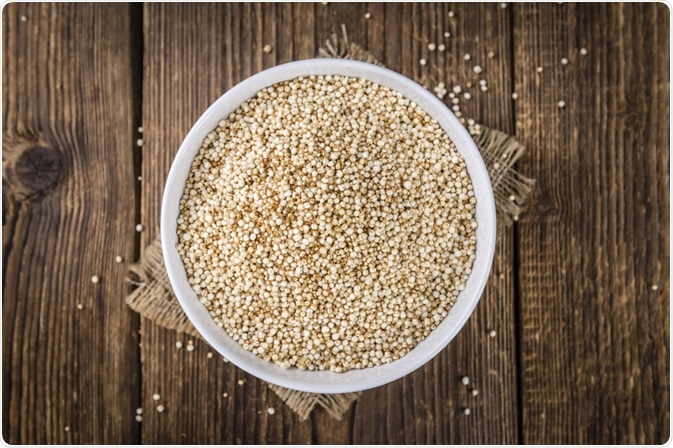Quinoa is an ancient grain belonging to the Chenopodiaceae family and is well-known for its high nutritional value. This article describes the reasons why quinoa is regarded as a "superfood".

HandmadePictures | Shutterstock
Quinoa is designated as a pseudo-cereal because it is not part of the typical Poaceae botanical family, where all other cereals or grains belong. The plant has its origin in the Andes; however, its broad genetic diversity allows it to be grown easily in different types of soils and adapt to different climatic conditions.
A multifunctional grain
Quinoa is a multifunctional grain that is rich in a variety of amino acids, vitamins, minerals, lipids, proteins, and fibers. It contain a wide variety of antioxidants and also phytohormones, giving quinoa more health benefits that other grains.
Quinoa also contains polyphenols such as phenolic acids, flavonoids, and tannins, which are responsible for its diverse physiological benefits. Another important factor is that quionoa is gluten-free, making it an excellent option for patients with celiac disease or gluten intolerance.
Quinoa also contains a bitter residue of saponins, which acts as a natural defense against insects and birds. This residue can be washed off before preparation to decrease the bitter taste; however, it does not need to be removed for safe eating.
What are the health benefits of quinoa?
Quinoa is referred to as a 'functional food' and helps to reduce the risk of a number of diseases. The nutritional qualities of quinoa are outlined below:
Rich source of antioxidants
The phytochemical constituents of quinoa are responsible for its antioxidant properties. Antioxidants help lower the risk of disease related to oxidative stress. Cancer, heart disease, diabetes, and obesity are some diseases for which antioxidants have been shown to be beneficial.
High in fiber
Quinoa is a good source of dietary fiber, which helps lower blood cholesterol and promote satiety. Due to its fibrous content, it resists digestion and absorption in the small intestine, and is largely fermented in the large intestine.
Best source of l-lysine
Quinoa is high in the amino acid lysine, which is usually lacking in legumes. Lysine is an essential amino acid needed for growth and maintenance of body. Lysine plays an important role in calcium absorption and building muscle protein.
Anti-inflammatory
The saponin fractions present in quinoa decrease production of nitric oxide, a key mediator of inflammation. Studies in mice show that saponins also inhibit release of inflammatory cytokines such as tumor necrosis factor-α and interleukin-6. These findings suggest that quinoa saponins may be used to prevent and treat inflammation.
Weight control
Studies have shown quinoa to have a potential lipid-lowering effect. Per a study published 2017 in Current Developments in Nutrition, the consumption of 50 g of quinoa per day is associated with lower serum triglyceride levels in overweight and obese participants. Consumption was also associated with reduced prevalence of metabolic syndrome.
Anti-cancer properties
Gawlik and colleagues reported that phenolic extracts of quinoa compound exert a chemopreventive and anticarcinogenic effect on oxidative stress and reactive oxygen species (ROS) dependent intracellular signaling.
Sources
- https://www.glnc.org.au/grains/types-of-grains/quinoa/
- https://www.ncbi.nlm.nih.gov/pubmed/28239982
- https://www.ncbi.nlm.nih.gov/pubmed/20814881
- https://www.ncbi.nlm.nih.gov/pubmed/26114306
- https://www.ncbi.nlm.nih.gov/pmc/articles/PMC5642801/
- https://www.ncbi.nlm.nih.gov/pubmed/24712559
Further Reading
- All Diet Content
- Low Calorie and Very Low Calorie Diets
- Diabetic Diet
- DASH Diet for High Blood Pressure
- High Protein Diet
Last Updated: Dec 19, 2018
Source: Read Full Article
